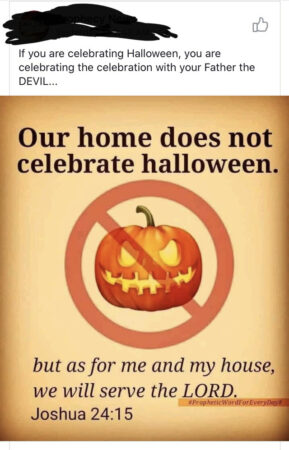Introduction
So I have written before on the subject of Halloween, both here and here. Some of what I say today will make better sense if you read those two pieces first. But that’s just a suggestion—you don’t have to. It’s a free country, or used to be at any rate.

Every year around this time, you can frequently see Christians going in two opposite directions. One says that the celebration of Halloween is obviously verboten, and to the extent that it has any vestiges of Christianity related to it at all, they are obviously papist. The other path points out that Halloween is a Christian holiday, for pity’s sake, embedded in the church calendar, and so just lighten up everybody. And I want to say yeah, but in both directions.
Suffocating Holidays
Approached in the right spirit, the church year helps us establish a rhythm of holiness. We learn to mark our days with reference to the life of Christ. Our lived experience is defined by the Incarnation and the Ascension instead of a secularized experience marked by Memorial Day and Labor Day. As with everything else, there is a ditch on both sides of this particular road, meaning that the thing can be overdone—or not done at all in a spirit of pinched censoriousness.
By the time of the high medieval period, the thing was obviously overdone. You couldn’t swing a cat without hitting some saint’s day or other, and the 28 finger bones of St. Andrew could be visited all over Europe. It was a time of great superstition, and over time the whole thing became suffocating. Two approaches to this suffocating reality then developed.
One was what the Protestant Reformers did. They pared the church calendar way back, marking a handful of particular days that had reference to the life of Christ. Thus we got the five evangelical feast days—Christmas, Good Friday, Easter, Ascension, and Pentecost. Gone was the Feast of the Martyrdom of the Goldfish of St. Denis. There were some intramural disagreements among Protestants about how and how much to pare—Calvin, for example, wanted to anchor Christmas to a Sunday, the way we do with Easter, while some of Cromwell’s men would patrol the streets of London on Christmas Day in order to detect the smell of anybody cooking a Christmas dinner, so’s they could bust them.

Now just as I had a little fun with the Goldfish of St. Denis, so also the friends of an over-stuffed church calendar have had a little merriment and fun with Cromwell’s men and their efforts at pious buzzkill. More about this in a bit.
But whether you were Protestant or not, you still had to deal with the suffocation factor. The Protestant effort had been to make the holidays more like the original holy days, and that meant doing it less, and doing it right. The alternative custom that developed was to grant, with a wink and a nod, certain limited holidays from holiness. Those are the two options. Fewer holy days of holiness, or more holidays from holiness.
This is best illustrated with another event from the swollen and overgrown church calendar, which would be Mardi Gras. This is the period right before Lent, which is a period of abstinence and penitence leading up to Easter. Because of the “giving up” part of Lent, Mardi Gras became the blow-out time, where you got all your sinning in beforehand. Get your sinning done before the deadline. Thus, if you want, as part of your observance of the resurrection of our Lord Jesus from the dead, and I can scarcely believe I am writing this, you can go to New Orleans during Mardi Gras to get glued, screwed, and tattooed. There would appear to be a disconnect somewhere in the thought processes of a whole lotta people.
Holidays from Holiness
But holidays from decency is a deeply embedded human impulse—no less sinful for all that, but it is not an uncommon phenomenon. Given the nature of the case, it comes out in various gaudy ways. The Amish have their “coming of age” rumspringa. The pagan Romans had their Saturnalia, where slaves could pop off at their masters without reprisal, and other social proprieties were greatly loosened or reversed. Something like this also happened in earlier British celebrations of Christmas, where a Lord of Misrule was selected—a sub-deacon or some peasant being selected by lot to preside over a festival of drunkenness and wild carousing. This could also be done under the presidency of a boy bishop. It is the same logic that you might find in a modern day office Christmas party—where stolid corporate types, working shoulder to shoulder for most of the year, decide to use the celebration of the Incarnation as an appropriate time to unleash all their inner lust monkeys. And what all these things have in common is that they grant permission to sin openly, in front of everybody, without consequences.
Now this was a big part of the background to the Puritan concerns about Christmas. A number of them did have “regulative principle” scruples about marking the day at all, which I do not, but we still have to remember their context. They thought about it the same way I think about Mardi Gras, and for similar reasons. The Puritans were not motivated by the outrage of a Victorian grandfather giving a wooden train and an orange to a ten-year-old boy. That was not their presenting problem because what we might call our “silver bells Hallmark Christmas” did not come into existence until the 19th century. The concern was a bunch of indiscreet and drunken misdeeds at the office party that resulted in nobody in the office being able to look at one another directly until part way into January. That’s what Epiphany was, when you could look people in the eye again.
A Distorted Understanding of Buzzkill
I mentioned the behavior of Cromwell’s men, which has served to make them a stench in the nostrils of fun-lovers everywhere. Unregenerate men loathe killjoys, and I grant that they sometimes have a point, but only up to a point. But Cromwell’s administration, which was sober, judicious and wise, was also a time when persecution was at a low ebb. Except for the lady who was caught cooking a Christmas goose, things were pretty stable. But his Interregnum is frequently compared very unfavorably to the Restoration, in which Charles II was returned to the throne, and “merry old England” came back into her own. But in the reign of Charles II, the reputation of merriment restored was largely undeserved, and it actually underscores how attached people are to their holidays from holiness. They will readily allow great severity against piety so long as there is laxity regarding lust.
That Cromwell’s men would bust up a party is the kind of thing that lives on in infamy, and the fact that Charles II presided over a severe persecution of dissenters is thought to be consistent with some deeper meaning of the word “merry.” He ejected almost 2,000 ministers from their pulpits, punished anyone over the age of 16 for attending a religious meeting that was not conducted according to the Book of Common Prayer, and prohibited any ejected minister from living within five miles of a corporate town or a place where he had previously ministered. The penalties could be draconian. In short, Charles II was not what I would call a merry monarch, at least not counting all the bastards he fathered. Buzzkill is yet another inescapable concept. It is not whether you kill buzz, but rather which buzz you kill.
Bringing It Back to Halloween
And so, the principle for parents at Halloween is that it should not be considered a “time out” from our regular standards of what constitutes godliness. Your kids can dress up as something fun, because that is always lawful. But why on earth would you want them to dress up as something gross or vile or macabre or gruesome or cadaverous or ghastly or morbid? Whatever is pure, Paul said, set your minds on that. Is it lovely? Is it virtuous and just (Phil. 4:8)?
We should of course not object to feasts or festivities, and so we do not. But when it threatens to become a carnival of sin, we object—not to the carnival, but to the sin.
This means that a fall carnival for the kids, with games and candy and costumes, is more than appropriate. And call it whatever you want to, so long as your naming of it does not make kids want to come as a vampire, or a zombie, or a hooker.

